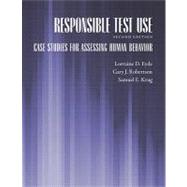
Note: Supplemental materials are not guaranteed with Rental or Used book purchases.
Purchase Benefits
What is included with this book?
Foreword
Kurt F. Geisinger
Preface
Acknowledgments
Part I: Introduction
Chapter 1: Overview
Chapter 2: Elements and Competencies of Good Test Use
Part II: Case Studies
Section 1: Professional Development: Training, Responsibility, and Ethics
Case 1. Personality Evaluation in a Scholarship Program
Case 2. Assessing English Language Learners
Case 3. This Gun for Hire
Case 4. Incumbent Testing for Apprenticeship Positions
Case 5. Assessing Police Officers
Case 6. Practicing Within Areas of Competence
Case 7. Untimely Timelines
Case 8. The Untrained Interpreter
Case 9. Use of Computer-Prepared Test Interpretations
Case 10. The Star-Struck Clinician
Case 11. Guilty for Lack of Evidence
Case 12. Dealing With the Press
Case 13. Buyer Beware
Case 14. When Test Preparation Goes Too Far
Case 15. The Uninformed Instructors
Case 16. Passing the Buck
Case 17. The Devil Is in the Details
Case 18. The Slick Salesman
Case 19. Personnel Screening for Emotional Stability
Case 20. Disposition of Psychological Test Reports
Case 21. Proper Interpretation of Test Results Requires Training
Case 22. Expert Testimony Can Hurt You or Help You
Case 23. A Sensitive School Psychologist
Case 24. Dealing With Parental Concern About Ethnic Bias in Testing
Case 25. Compromised Test
Section 2: Test Selection
Case 26. Using the Wrong Cutoff Score From the Wrong Test
Case 27. Unguided Referral
Case 28. Making Up Your Own Tests
Case 29. Poor Choices and a Misdiagnosis
Case 30. How Competent Do You Really Have to Be?
Case 31. Misleading Public Statements
Case 32. The Graduate School Admissions Conundrum
Case 33. Insufficient Assessment
Case 34. What Memory Problems?
Case 35. I Can't Read, but I Know What's Going On
Section 3: Test Administration and Scoring
Case 36. Standardized Administration Procedures
Case 37. Intellectual Assessment of a Bilingual Student
Case 38. The Incompetent Examiner
Case 39. Using Substandard Testing Equipment
Case 40. Unwanted Help Screens
Case 41. Not Following Established Protocol
Case 42. Testing Individuals Who Are Blind
Case 43. Scoring Errors Plague High-Stakes Tests
Case 44. Banking on the Test
Case 45. A Case of Failure to Communicate
Case 46. College Placement by Internet
Case 47. Testing College-Bound Students With Physical Disabilities
Section 4: Test Interpretation: Principles, Norms, and Psychometrics
Case 48. Pitfalls in Comparing Scores on Old and New Editions of a Test
Case 49. Are Observed Score Differences Trustworthy?
Case 50. Special Children Need Special Tests
Case 51. Are You Paranoid When People Really Are Against You?
Case 52. It's a Man's Job
Case 53. High School Rankings Rankle Educators
Case 54. The Puzzling Chinese Personality Profiles
Case 55. Responsible Interpretation of Test Score Differences
Case 56. The Use and Misuse of Psychological Testing
Case 57. The Lopsided High School Admissions Test
Case 58. The Below-Average Sicilian Gifted Students
Case 59. Date Matching
Case 60. The Missing Personality Test
Case 61. Don't Believe Everything You Hear
Case 62. A Faculty Member in Distress
Case 63. Test Results Without Interpretation
Case 64. Confusing Norm-Referenced and Criterion-Referenced Test Scores
Case 65. Evaluating Children With Hearing Impairments
Case 66. The Questionable Cutoff Score
Case 67. Immigrants Lose Financially
Case 68. Comparing Proficiency Levels on State and National Assessments
Case 69. An English Language Learner's Aptitude Test Anxiety
Case 70. Inconsistencies Between Test Results and Behavior
Case 71. Being Locked Up Makes A Difference
Case 72. Using Out-of-Level Testing and Grade-Equivalent Scores for Instructional Planning
Case 73. Assessing Similar Constructs in Different Cultures
Case 74. Narrowing Educational and Vocational Options
Section 5: Reporting Test Results to Clients and Administrative Policy Issues
Case 75. Borderline Practice
Case 76. What Does a Percentile Rank Mean?
Case 77. Conducting Individual Assessments
Case 78. The Well-Meaning Trainer
Case 79. The Right Test in the Wrong Way
Case 80. Computer Feedback in Career Counseling
Case 81. A Case of Speedy Selection
Case 82. Selecting Doctoral Students at Best State University
Case 83. Inappropriate Choices Affect Referral for Treatment
Case 84. Using Test Results to Promote a Prestigious Private School
Case 85. Saying Too Much on the Basis of Too Little
Appendices
Contributors of Incidents and Casebook Reviewers
Index of Cases Classified by Competency
Index of Cases Classified by Element
References
Index
About the Authors
Key to Competencies and Elements
The New copy of this book will include any supplemental materials advertised. Please check the title of the book to determine if it should include any access cards, study guides, lab manuals, CDs, etc.
The Used, Rental and eBook copies of this book are not guaranteed to include any supplemental materials. Typically, only the book itself is included. This is true even if the title states it includes any access cards, study guides, lab manuals, CDs, etc.